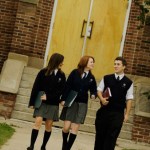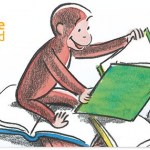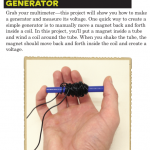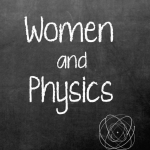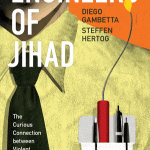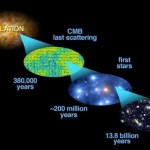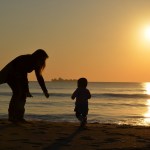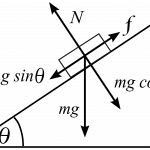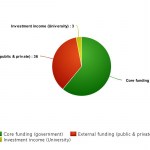education
Every once in a while, I'm happy to use this blog to throw my support behind a worthy project. And there's nothing like children's science books about women in science!
Check out the Kickstarter for Science Wide Open: Children's Books about Women in Science, and consider joining me in helping this amazing project come to fruition.
Science Wide Open: Children's Books about Women in Science
When children ask questions, their whole world becomes their experiment
Kids ask a LOT of questions. The inquisitive star of Science Wide Open is no different! Her questions about how the world works guide…
Corporal punishment in America’s public schools seems like a relic of the past — a practice we had surely banned long ago. The reality, however, is that it’s perfectly legal to physically discipline students as young as preschoolers in 19 states. And according to a new report, corporal punishment is most often used against black students and students with disabilities.
Released earlier this week as a “Social Policy Report” from the Society for Research in Child Development, the report found that in Alabama and Mississippi, black children are at least 51 percent more likely to be physically…
There's a piece in Inside Higher Ed today on yet another study showing that student course evaluations don't correlate with student learning. For a lot of academics, the basic reaction to this is summed up in the Chuck Pearson tweet that sent me to the story: "Haven't we settled this already?"
The use of student course evaluations, though, is a perennial argument in academia, not likely to be nailed into a coffin any time soon. It's also a good example of a hard problem made intractable by a large number of assumptions and constraints that are never clearly spelled out.
As discussed in…
Back to school special:
I'd like to note that not every teacher who "moves to a school in the suburbs" does so for bad reasons. Some of them do so after being handed a $10,000 per annum pay cut and a contract with zero chance of a raise for the indefinite future or something else along those lines. In other words, while I strongly agree with Olivia Fantini, she may have some unexamined privilege of her own in blaming teachers for their own victimization.
Taxpayers, anti-tax organizations, and the elected officials bought and paid for by them are at the root of most of our problems in…
A couple of weeks ago, I was asked to speak on a panel about teaching during Union's new-faculty orientation. We had one person from each of the academic divisions (arts and literature, social science, natural science, and engineering), and there was a ton of overlap in the things we said, but here's a rough reconstruction of the advice I gave them:
1) Be Wary of Advice
Because it's always good to start off with something that sounds a little counter-intuitive... What I mean by this is that lots of people will be more than happy to offer advice to a new faculty member-- often without being…
Amazon FreeTime Unlimited is a subscription service that covers children. I normally avoid subscription services of any kind. But, I have a six year old, and suddenly it made sense.
Huxley is very tech savvy for a newly minted first grader. Last night I was reviewing a new tablet that had multiple operating systems on it. He was building a robot or something and watching me at the same time (I was projecting the tablet’s image on a big screen). I said out loud, but mainly to myself, “How the heck to I change operating systems on this?” Huxley reached over and pointed at a button that did not…
The simplest project in the new book Electronics for Kids: Play with Simple Circuits and Experiment with Electricity! by Øyvind Nydal Dahl is the one where you lean a small light bulb against the two terminals of a nine volt battery in order to make the light bulb turn on.
The first several projects in the book involve making electricity, or using it to make light bulbs shine or to run an electromagnet.
The most complicated projects are the ones where you make interactive games using LED lights and buzzers.
Electronics for Kids: Play with Simple Circuits and Experiment with Electricity!…
Women and Physics by Laura McCulloch is a concise addition to the IOP Science Concise Physics series.
McCullough is an award winning Professor of Physics at UW Stout, and served for several years as the chair of that university’s Chemistry and Physics Department. Her research focuses on physics education, and gender and science. By both chance and design, I know a lot of people in this area, and I’m pretty sure IOP Science could not have had a better choice in authors for this important book.
How do you make a physicist? Well, you start with a child, and poke at it for 25 year or so until it…
A disproportionate percentage of Islamist radical actors, including suicide bombers, come from an engineering background. Why?
Right wing and Islamist extremism seem to share this and other traits, while left wing extremism is more commonly associated with individuals from the humanities and social sciences.
This is what we learn from "Engineers of Jihad: The Curious Connection between Violent Extremism and Education", by Diego Gambetta and Steffen Hertog.
An obvious reason that engineers may be more often associated with groups that carry out bombings is that such groups recruit engineers…
“Those who know that the consensus of many centuries has sanctioned the conception that the earth remains at rest in the middle of the heavens as its center, would, I reflected, regard it as an insane pronouncement if I made the opposite assertion that the earth moves.” –Nicolaus Copernicus
There are certain words that simply get people’s hackles raised, shutting off the part of their brain that normally responds to reason and instead results in an emotional response taking over. For some, that word is “theory,” one of the words with the biggest gap between its colloquial and scientific uses…
The road toward eliminating the threat of asbestos has been long, slow-moving, incredibly frustrating and littered with significant hurdles. Thankfully, advocates like Linda Reinstein, who lost her husband to asbestos-related disease in 2003, refuse to get discouraged.
As co-founder and CEO of the Asbestos Disease Awareness Organization (ADAO), Reinstein works to unite those who’ve been personally impacted by asbestos-related illness, raise awareness about the continuing threat of asbestos, and advocate for policies that reduce exposures among workers, their families and the public.…
It's one of those days where none of the stuff I probably ought to be writing seems even slightly appealing, so instead I'm going to do something frivolous and morale-boosting, namely think out loud about an imaginary course. Despite being on sabbatical, I do still check my work email, and have caught the edges of a new round of arguments about whether we're providing enough "Gen Ed" science courses pitched at non-majors. The hardest part of this is always meeting the "science with lab" component, because those courses are pretty resource-instensive, and we have a limited set of them that we…
When President Obama signed the Healthy, Hunger-Free Kids Act in 2010, he also ushered in the first major nutrition changes in the school meal program in 15 years. Perhaps, not surprisingly, the changes received a good bit of pushback, with many arguing that healthier foods would mean fewer kids buying school lunches and big revenue losses for schools. But a new study shows otherwise.
Last week, a study published in the American Journal of Preventive Medicine and that focused on 11 Massachusetts school districts found that while schools experienced initial losses following the meal changes,…
It's been a while since I last rounded up physics posts from Forbes, so there's a good bunch of stuff on this list:
-- How Do Physicists Know What Electrons Are Doing Inside Matter?: An explanation of Angle-Resolved Photo-Electron Spectroscopy (ARPES), one of the major experimental techniques in condensed matter. I'm trying to figure out a way to list "got 1,800 people to read a blog post about ARPES" as one of my professional accomplishments on my CV.
-- The Optics Of Superman's X-Ray Vision: Spinning off a post of Rhett's, a look at why humanoid eyes just aren't set up to work with x-rays…
"It is possible to commit no mistakes and still lose. That is not a weakness, that is life." -Jean-Luc Picard
The cosmic story common to all of us -- where we came from, how we got here and where we're headed into the future -- is both amazing and daunting. But when we're first exposed to the vastness of it all in terms of both time and space, it can be downright terrifying.
Image credit: NASA and the Hubble Heritage Team (STScI / AURA), Hubble Space Telescope / ACS.
This is particularly true for young children, who often experience a huge existential crisis when they realize that not only…
"All truths are easy to understand once they are discovered; the point is to discover them." -Galileo Galilei
Galileo is most famous for his astronomical discoveries, including the moons of Jupiter, the existence of sunspots and the phases of Venus. These discoveries were a strong challenge to geocentrism, and his writings and debates helped popularize the heliocentric model.
Image credit: Wikimedia Commons user Fernando de Gorocica, under a c.c.a.-s.a.-3.0 license, of Galileo’s original (1610) sketches of the phases of Venus.
Yet, in a recent article for Aeon magazine, Thony Christie…
"When we make college more affordable, we make the American dream more achievable." -Bill Clinton
Over the next four years, the University of Helsinki will see its budget reduced by approximately 100 million Euros, or about 15% of its annual expenditures. As a response, it's reducing its workforce by 980 members, a necessary cut given the budgetary changes.
Image credit: E. Siegel, created at https://www.meta-chart.com/pie, with data from University of Helsinki here: https://www.helsinki.fi/en/university/strategy-and-management/universit….
Yet how they chose to cut their budget…
As you probably already know, last year we ran a workshop at the Joint Quantum Institute for science-fiction writers who would like to learn more about quantum physics. The workshop was a lot of fun from the speaker/oragnizer side, and very well received by last year's writers, so we're doing it again:
The Schrödinger Sessions is a three-day workshop for science fiction writers offering a “crash course” in modern physics, to be held at the Joint Quantum Institute (JQI), one of the world’s leading research centers for the study of quantum mechanics. We will introduce participants to…
One of the evergreen topics for academic magazines like Inside Higher Ed and The Chronicle of Higher Education is faculty "mentoring." It's rare for a week to go by without at least one lengthy essay on the topic, many of which recirculate multiple times through my various social media channels. The latest batch of these (no links, because this isn't about the specific articles in question) prompted me to comment over in Twitter-land that:
Articles about "mentoring" of faculty are great for reminding me of all the ways I'm atypical for an academic personality-wise.
— Chad Orzel (@orzelc)…
"I cannot help fearing that men may reach a point where they look on every new theory as a danger, every innovation as a toilsome trouble, every social advance as a first step toward revolution, and that they may absolutely refuse to move at all." -Alexis de Tocqueville
You don’t need to be right to be a scientist, and your theory doesn’t need to be correct to be a scientific theory. While there is a big difference between the way we colloquially use the word theory (to mean “idea”) and the way scientists use it (to mean “testable idea”), there are actually three different stages…
